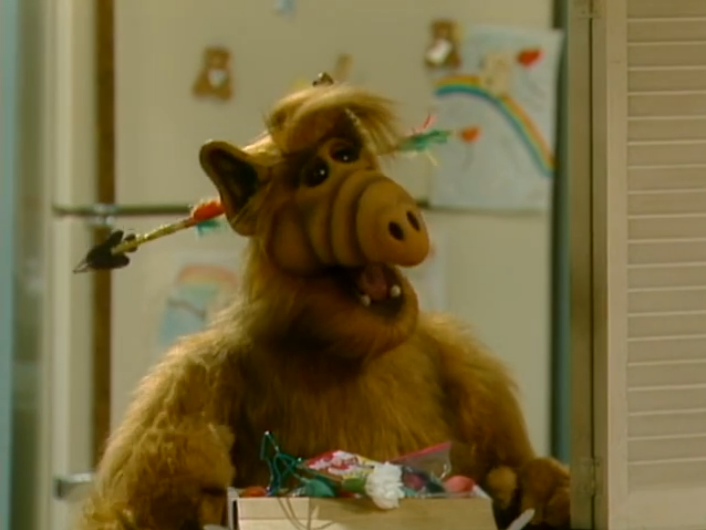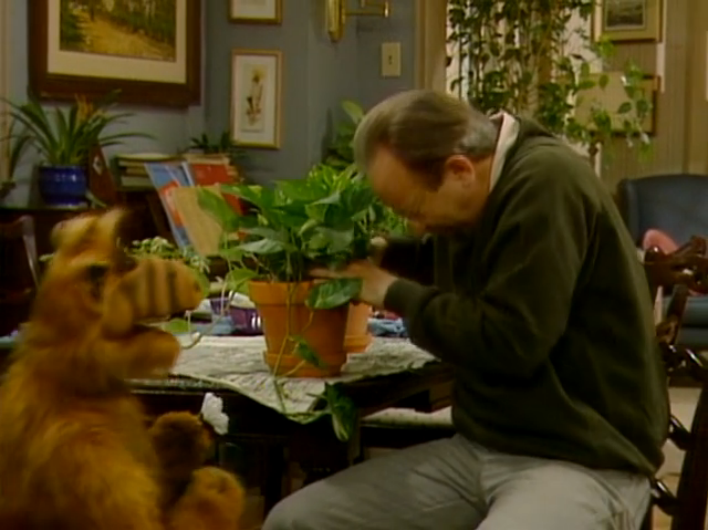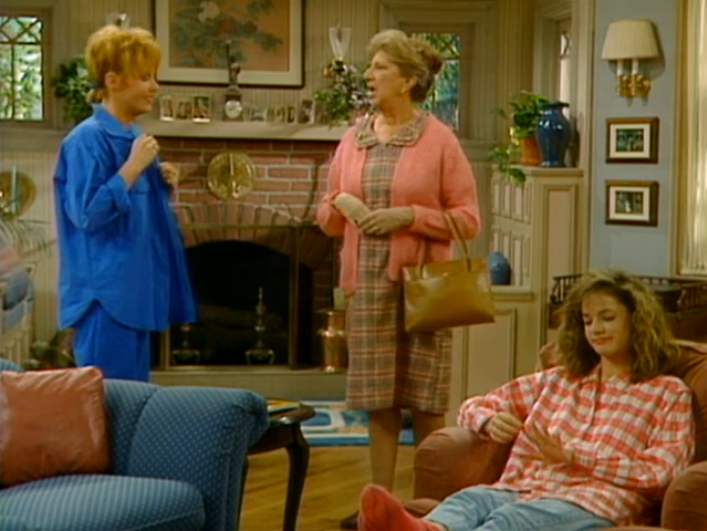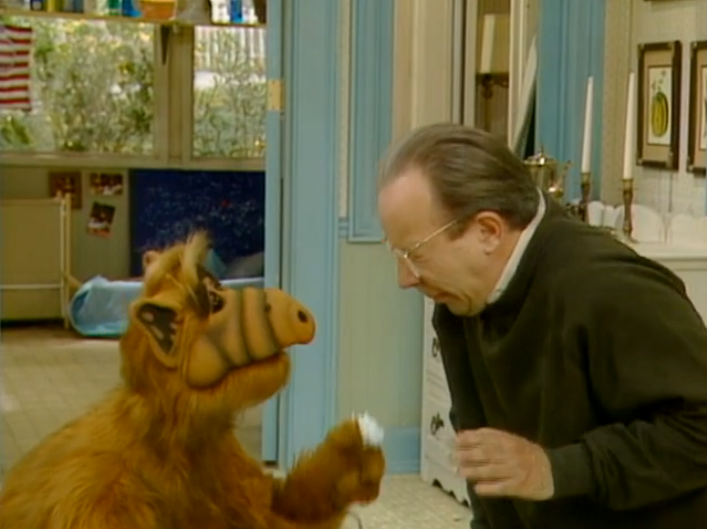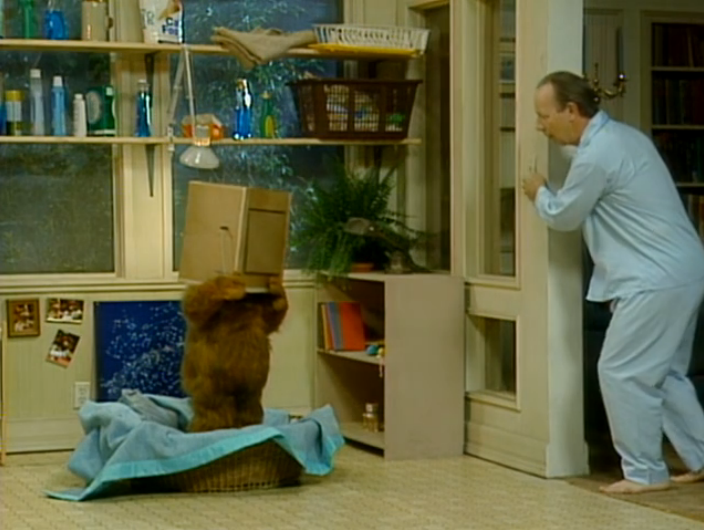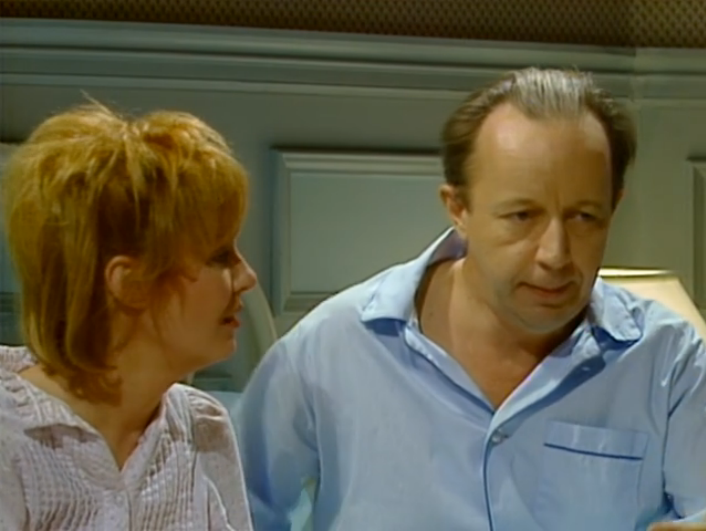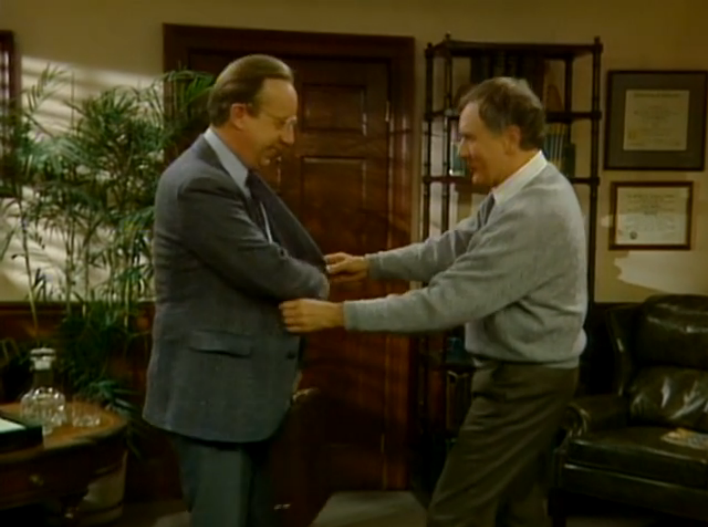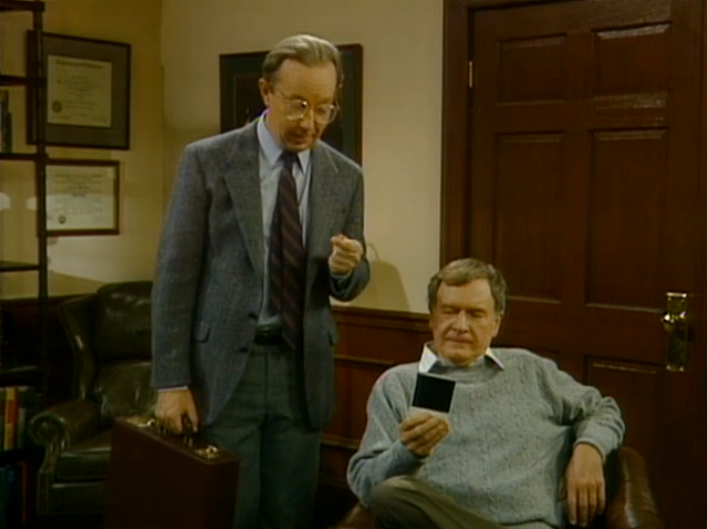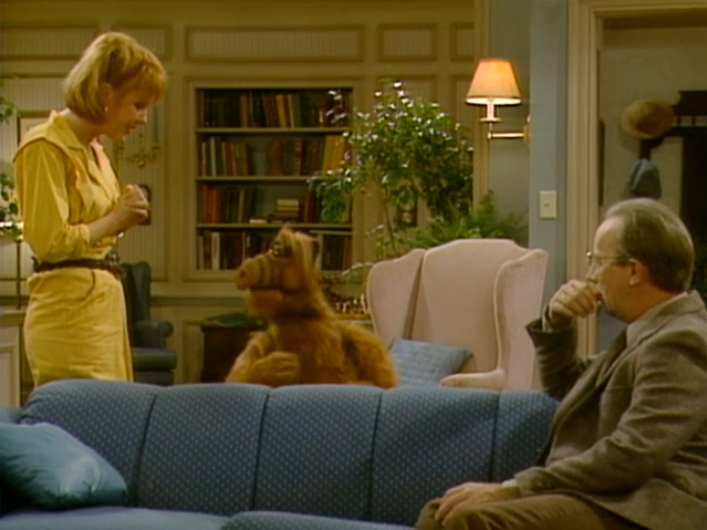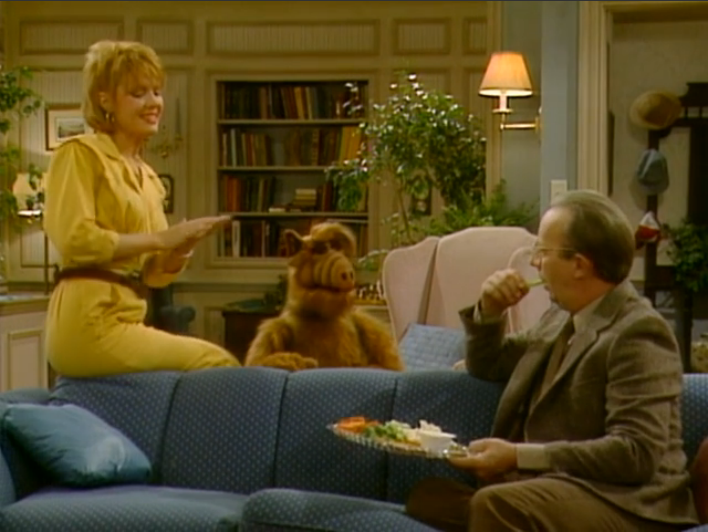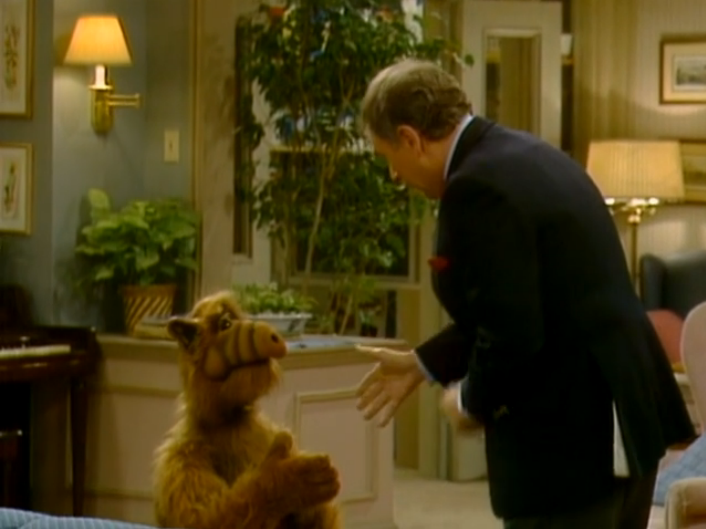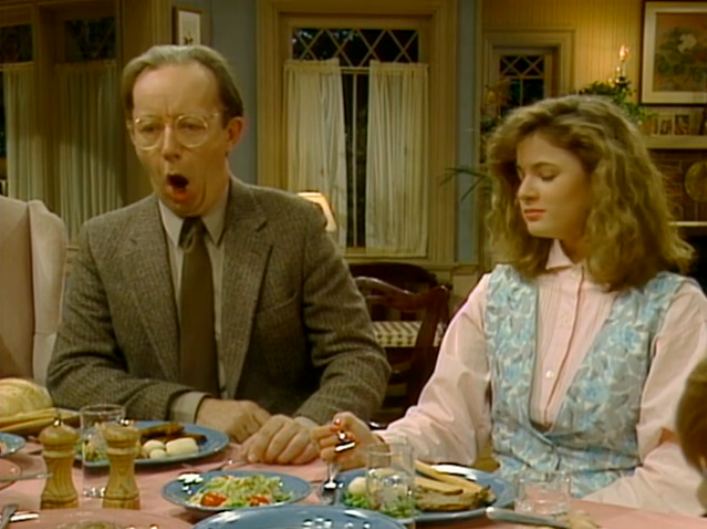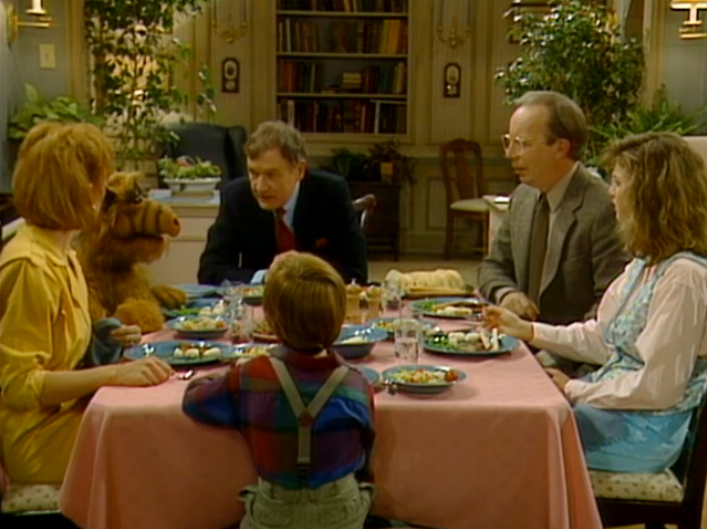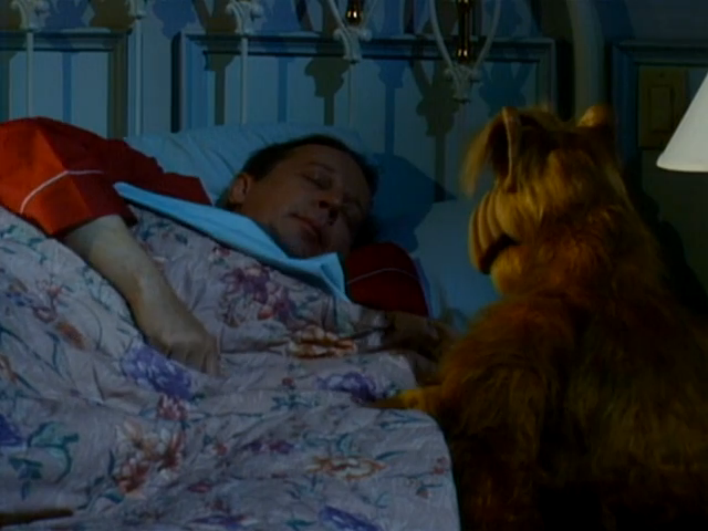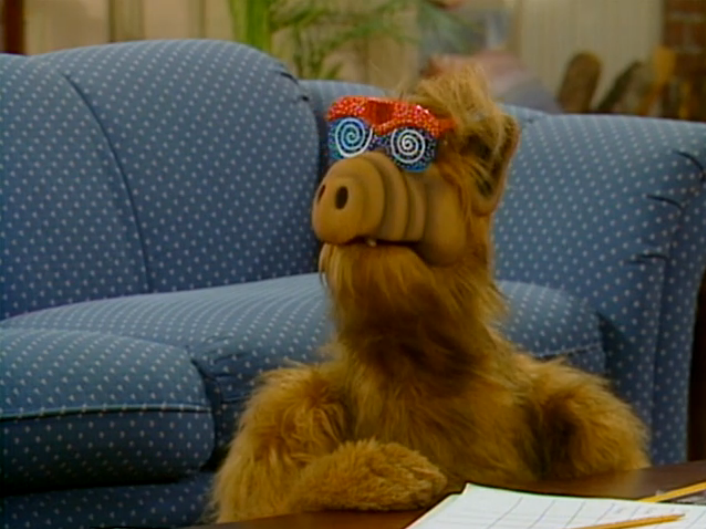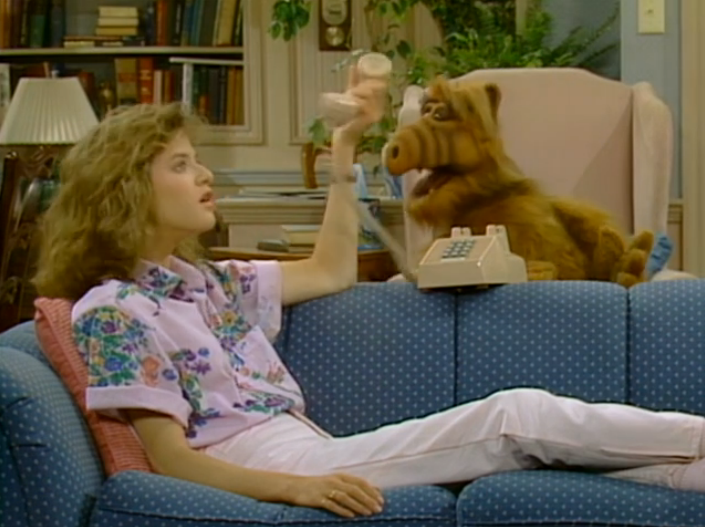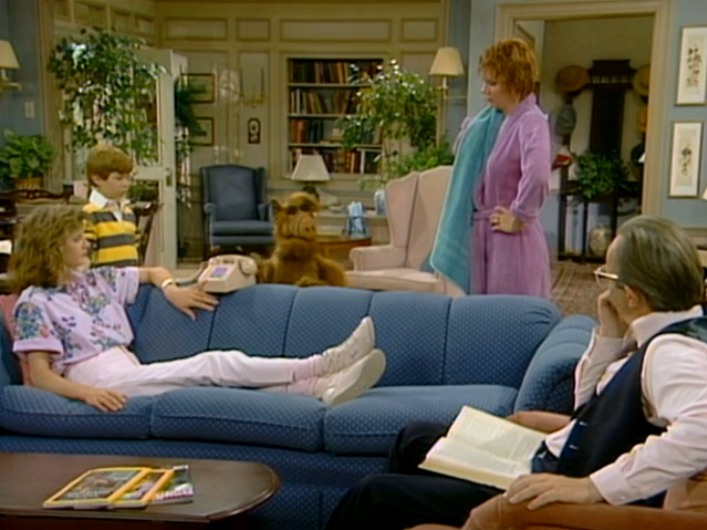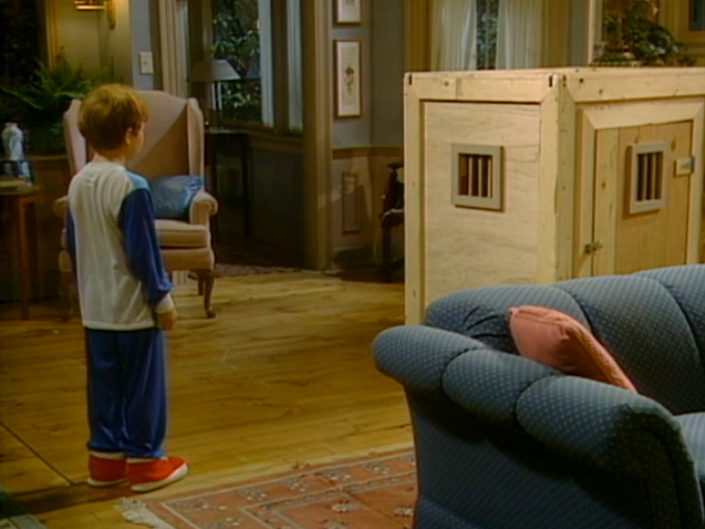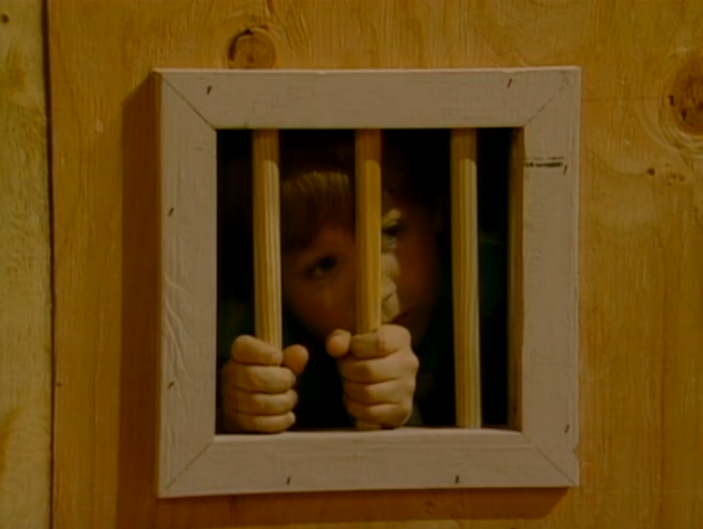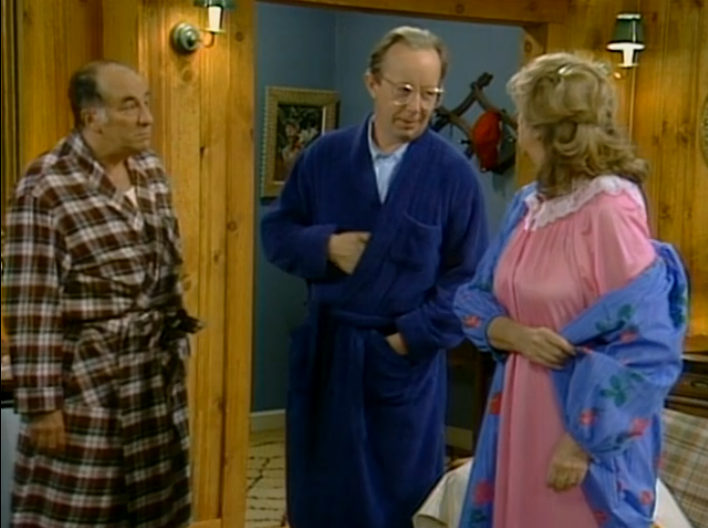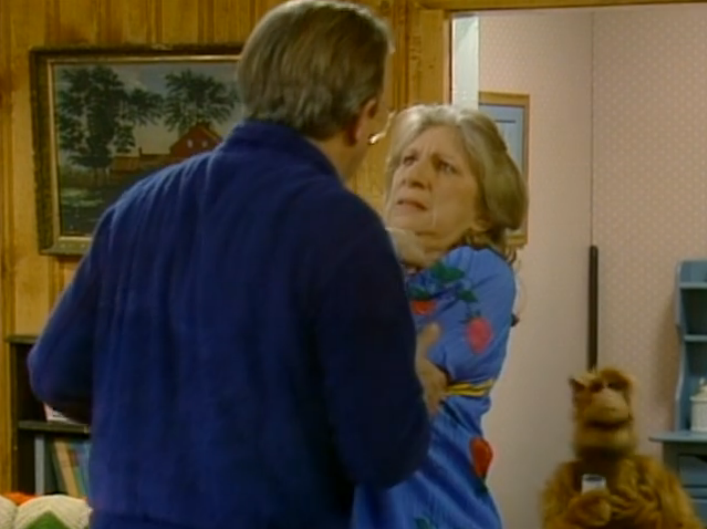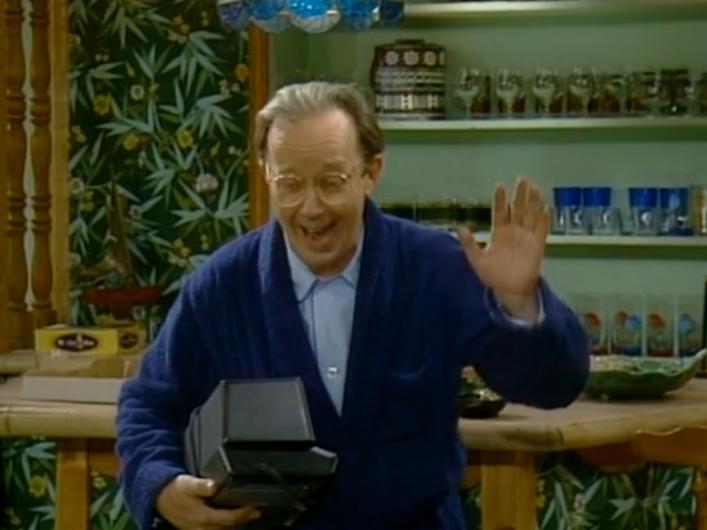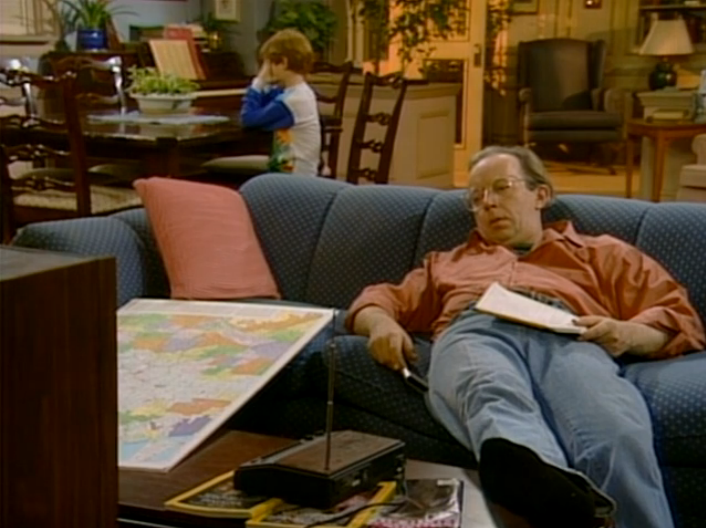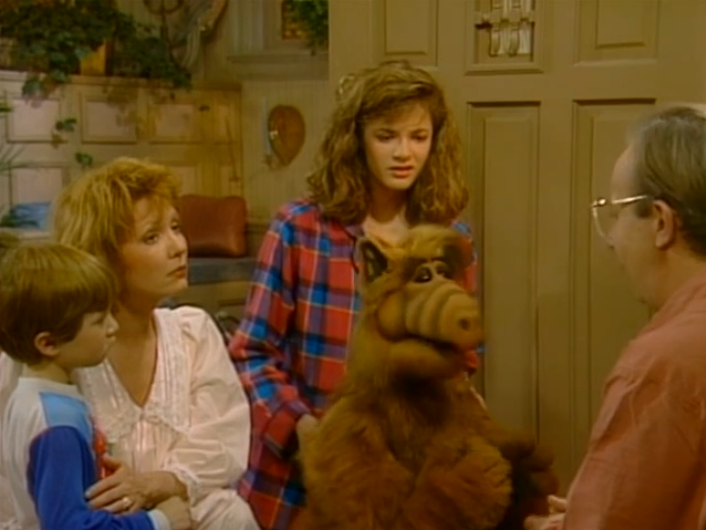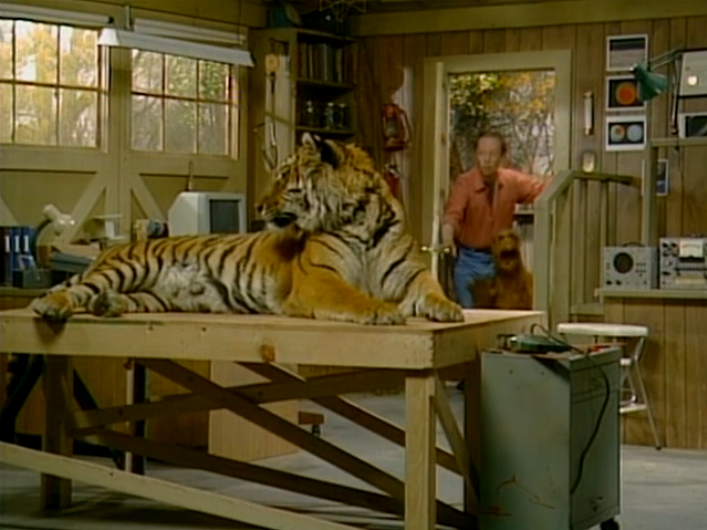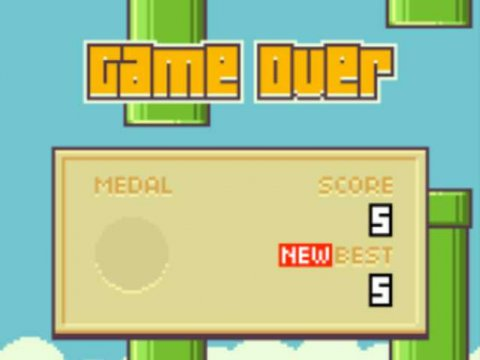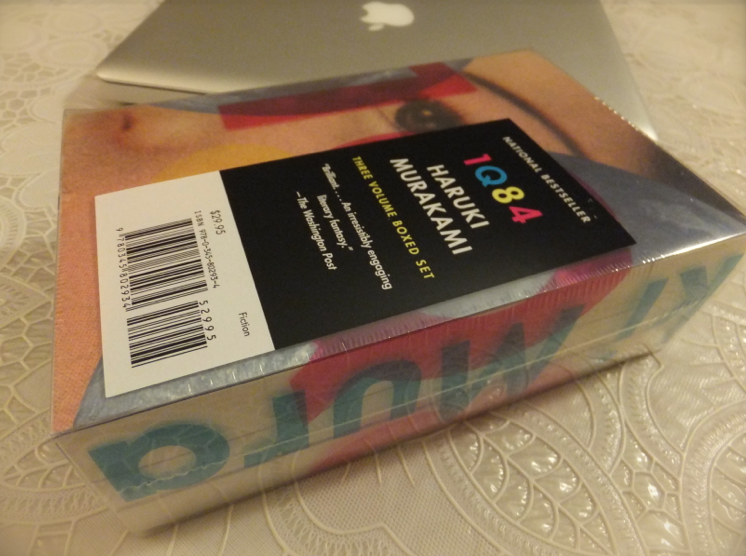Ever since “For Your Eyes Only,” also known as the Jodie episode, I’ve had a solid reference point for what ALF can achieve when it gives a shit. It would be one thing if the show was consistently bad, or if it had some sort of lame, go-nowhere premise, but neither of those things is true; the writing periodically achieves cleverness, and the premise — I’ll argue this to my grave — is excellent. The problem is that the show is so frequently content with lazy scripts and storylines that have nothing to do with the main selling point: a space alien living in an unfamiliar world.
“For Your Eyes Only” was an exception. It was more or less front-to-back good, it had a surprising depth of emotion, gave us the show’s first (and so far only) rounded character, and it built upon a key aspect of the show: as an alien, ALF can’t leave the house, and therefore he feels lonely.
Most episodes of this show, as I’ve argued in the past, could swap ALF out for a neighbor, a hobo, an annoying uncle, or anything else, and almost nothing would have to change. Scripts feel like they’ve been reappropriated from other shows, and the closest thing to an identifiable artistic voice here is “incompetence.” In “For Your Eyes Only,” though, ALF’s bond with a blind woman and (unfortunately) short-lived bond with Lynn are both rooted firmly in the show’s central concept. ALF, for once, couldn’t be swapped out for any other sitcom archetype; the whole reason the story could be told at all was because it was specific to this character, in this situation, facing this issue.
So when I speak wistfully about the Jodie episode like an old lover, it’s not to dwell so much as it is to remind myself — and yourself — that ALF is capable of better work. Reviewing this show isn’t taking shots at an easy target…it’s taking shots at a lazy target. The show can do better, has done better, and should do better. “For Your Eyes Only” is the only real evidence that this can work.
Or, was. Because now, as the first season winds slowly to a close, we get another glimpse of greatness from ALF. “Going Out of My Head Over You” taps into the nature of the title character, and like “For Your Eyes Only” expands upon it and explores it in an unexpected way. It represents the most significant sustained competence since that episode, and it may actually hit more impressive highs.
So, you know, if you want a disappointed review, go read “Wild Thing” again.
…or just keeping reading this. Because, to be honest, the first half of it or so is pretty ropey. It starts off with Brian lying about a basement flood, because his friend wants to sleep over and that can’t happen with ALF in the house.*
Willie doesn’t like that Brian told a lie, and gives a little speech about how lying is always wrong…and I really can’t tell if this is deliberately ironic, since lying about things is crucial to the concept of the show. They are harboring extra-terrestrial life, after all. In fact, in a moment there’s another scene about lying, and I started to get the impression that that would function as a kind of theme in the episode, or at least give “Going Out of My Head Over You” its moral.
Neither happens, which makes it feel — as usual — like a first draft. The writers had some ideas while they worked on act one, stumbled upon something else as they wrote act two, and then never went back to change the opening. Even at its best ALF has problems…and the first act of this episode is nowhere near ALF at its best.
Hey, speaking of that, ALF just happens to walk into the living room and ejaculate water out of a flower onto Willie’s face and neck. It’s not quite as overtly sexual as the facial scene in “Keepin’ the Faith,” but Max Wright shielding his eyes and mouth from the unexpected squirt (and ALF gyrating with pleasure) definitely makes this repulsive in its own uncomfortable way.
The moment is redeemed, however, if we look at it as setup for a genuinely great line. Brian asks where ALF got the squirting flower, and he replies that he sent away for a whole box of silly novelties like this. Then he marvels, “That Taiwan must be the most fun place on Earth!”
That’s not just a funny line — and it really is a funny line, especially with Fusco’s wide-eyed, innocent reading — but, again, it’s crucial to who ALF is. He’s an alien, and he’s drawing connections based on his limited experience. We see a box of junk, but he sees a box of fun. We see the “Made in Taiwan” stamp and we think it’s cheap garbage, but he sees it and thinks the entire country must be a wonderland straight out of Willy Wonka. It’s comedy and it’s character work. Don’t blame me for getting excited; usually we get neither.
Mrs. Ochmonek comes over, so ALF scurries off into the kitchen. She’s only here for this scene and doesn’t do anything but sit on ALF’s whoopie-cushion (a moment that is emphatically not redeemed by any clever lines). However her presence does require Willie to actively lie about ALF — in terms of explaining the whoopie-cushion, and the hair all over the couch — which I took as more evidence that this would be an episode about dishonesty. After all, if it’s not, why have this scene at all?
The thing is, a dishonesty episode would be a pretty good idea. Willie frets during act one about instilling a sense of honesty in his son. That’s a fair point of concern for any father, but in this case it’s complicated by their environment; Willie doesn’t want Brian to lie, but he’s raising him in a house in which lies must be told regularly. There’s a perfect narrative cross-section there…it’s a general, relateable human story, and it’s also a story that addresses the unique context in which this show takes place. Played correctly, we could end up with something like what Hank goes through in the Venture Bros. episode “Assassinanny 911.” Relateable conflict; exceptional circumstance.
We don’t get that here, and it’s frustrating. It’s like playing Hot and Cold with a friend, seeing them get so close to what they’re looking for, and yet they can’t find it, however obvious it seems to you. This was a good idea. Granted, I do like what we get instead, but there’s no reason that such a strong topic should be relegated to setting up a different plot altogether. It was worth an episode of its own far moreso than Willie jumping out of a plane or Kate Sr. getting pissed off at a soap opera.
Oh well. The important thing is that Willie goes into the kitchen and ALF jizzes in his eyes again.
It’s strange that they reanimated Mrs. Ochmonek for this episode and “Wild Thing,” but in both cases they just have her hang around for some irrelevant scene and then disappear again. Her entire purpose here seemed to be to pad out the space between the two times ALF wets Willie** and that hardly seems worth bringing her in.
Maybe they had a contract with Liz Sheridan — or Lady Seinfeld, as she likes to be called — for a certain number of episodes, and so they squeezed her into as many as they could late in the season because there was nowhere else to put her.
This show is so crappily made that I find it hard to write about the episodes I like without inadvertently reminding myself of why they’re so few in number.
Okayokayokay that’s enough of that. Back to the episode. I need to remind myself of why I like this episode. Let’s just see what…
…oh, come on.
Willie skulks around the house in the middle of the night and finds ALF standing in his bed wearing a wooden box and making robot noises.
I’m trying to help you here, show, but I really need you to help me too.
Willie then steps on some tacks that ALF put on the floor and then when he leaves he steps on some more tacks that ALF put on the floor.
Guys, I don’t know. Maybe I’m just really sick. Maybe I’m dying.
Willie gets in bed with Kate and immediately initiates…lol nah I’m kidding. He talks about ALF. What a fun, sexy time for her.
He bitches on about ALF’s everlasting dickshit, and Kate suggests that he see a psychologist. In real life this would be the precursor to her next suggestion, which is that they get a divorce, but here she’s just trying to address his concerns. It’s nice of her, but I don’t know how Willie seeing a therapist is going to resolve the issue, which is that ALF’s been jogging in public, throwing tacks everywhere, and having robot dance parties in the middle of the night. I’m not saying a therapist is a bad idea, but I am saying it would be an indirect approach at best. Especially when, you know, they could just kick him out of the house.
Seriously, I know I bring this up a lot, but why does ALF have all of the power in this house? Why don’t they issue him an ultimatum? He’s fucked the moment they toss him out on his ear, so why do Willie and Kate act like he’s the one holding all the cards? Fuck this guy.
It’s even more puzzling if Willie’s concerned that keeping him in the house is cultivating a sense of dishonesty in his children, but nevermind, that part of the plot is over with. We’re doing something different now.
ALF then comes into the bedroom with a banana to watch Willie and Kate sleep. But you probably could have guessed that.
Willie goes to see the psychologist; they’re old friends who haven’t seen each other in a while I think. They greet in that slightly stilted way that two adults do when they’re glad to see each other but still not sure what to say, and that’s fine, but then Dr. Dykstra does a weird thing where he opens Willie’s jacket and says, “What’s that?! What’s that?!”
I think the idea was that he was referring to Willie having put on weight, but it actually looks like he’s making fun of Willie for getting an awkward boner. In fact, I’d believe that long before I’d believe that Max Wright had anything like a gut.
This is the pivot-point for the episode as the plot proper is set in motion, but before I get into that I want to take a moment to point out a little bit of stunt-casting*** that I didn’t notice until I did some research to remind myself of the doctor’s last name. (As they’re on friendly terms, Willie mostly calls him Larry.)
Dr. Dykstra is played by Bill Daily, who played Howard Borden in The Bob Newhart Show. In the waiting room there’s another patient played by Jack Riley, who was also on The Bob Newhart Show as Mr. Carlin. Later in the episode, ALF actually name-drops that show. And what was Bob’s profession? Psychologist. It’s a nice bit of subtle resonance, and the episode doesn’t draw any direct attention to it. That’s…pretty awesome, and evidence that somebody who worked on this show cared about something other than punching out on time.
Anyway, Dr. Dykstra correctly susses out the fact that Willie might have a problem. He amazingly deduces this, I guess, from the fact that WILLIE WENT TO SEE A PSYCHOLOGIST. Willie, however, tries to pretend everything’s okay, and, for once, incredibly, Max Wright’s hollow, dusty line readings fit the context; he does his best to lie to Dr. Dykstra but then blurts, sadly, “I have a creature from outer space living in my house,” and it plays like a sincere admission of defeat from a man genuinely miserable with his life.
It’s…a very effective moment. It manages to serve as an almost retroactive characterization, as it recontextualizes every single line of dialogue the man’s had. It’s a late-game attempt to squeeze some character into Willie, and unquestionably it should have happened much sooner, but the important thing is that it works.
Will it carry over into future episodes? Well, I kind of doubt it. But that isn’t something we should hold against “Going Out of My Head Over You.” It just means it will work better in isolation than as part of a series, just as “For Your Eyes Only” does.
Willie shows Dr. Dykstra a Polaroid of ALF as proof that he’s not crazy, and Willie ends up offering a vague kind of apology for being upset by ALF, saying that he “has some wonderful qualities.” We might even be meant to agree with that, but watching this with the knowledge that ALF’s been a sentient dick in every one of his earlier scenes it just makes Willie’s character seem even more pathetic and defeated…a man attempting to justify his complacency in a life of abject misery.
I know I’m spending a lot of time talking about what’s essentially a pretty short scene, but it’s actually quite good. It’s unquestionably Max Wright’s finest hour, as some writer figured out a way not only to play to the actor’s strengths, but to recontextualize his perceived weaknesses.
The entire character gets reframed completely; the awkward, sputtering nuttiness of his delivery isn’t anything unique to this exchange, but it has a home here. It’s never been normal, but now a change in context lets us know that that’s A Good Thing, because we’re not supposed to register it as normal. It indicates a problem. The episode is telling us that this is why Willie’s been this way all along. It’s an obvious retcon, but it’s a welcome one.
The honesty plot might have been ditched, but at least they managed to replace it with another topic specific to the premise of the show, and one at least as worthy of exploration. Kate’s rationale for sending Willie to Dr. Dykstra was a bit limp (again, Willie wasn’t complaining about feeling upset…he was complaining about ALF dickin’ out every hour of the day), but once the episode does get him there, it makes it worth the bumpiness of the ride.
Dr. Dykstra asks to come to the Tanner house in order to observe ALF. There are obviously two levels of interest at play here: personal, and professional, and that complicates something later on in an interesting way.
First, though, the family tells ALF that they have good news: a guest is coming over, and he won’t have to stay hidden all night. Fairly enough, ALF panics, afraid that they’ve tired of the dickcloud hanging constantly over their heads and turned him in to the Alien Task Force.**** Willie and Kate rush to assure him that’s not the case…but why? Let him think for a while that there’s some consequence for the shit he pulls.
In this episode alone he’s squirted all over Willie’s face, annoyed people with a whoopie-cushion, pierced Willie’s foot with a tack, bothered people in the middle of the night with some kind of robot dance, and then ate a banana while watching Willie and Kate in bed. Oh, and last week he carved a path of destruction throughout Los Angeles that led directly to the Tanners’ front door, in case you forgot. He should believe he needs to watch what he does, but instead Willie and Kate trip over themselves to assure him that he doesn’t. It’s insane.
BUT GUYS I LIKE THIS ONE SO LET’S FOCUS ON SOMETHING FUNNY LIKE THE WAY A VEGETABLE TRAY APPEARS MAGICALLY IN WILLIE’S HAND
It’s a very clever bit of foreshadowing for season four’s “Mind Games,” in which it is revealed that Willie is a telepath.
…no, it’s just shitty editing. I used to point out stuff like this a lot more when I didn’t realize I was watching syndication edits. Now I’m reluctant to do so, because it’s possible that when the show originally aired things didn’t jump around like this. I guess it doesn’t really matter, though. Whether the terrible editing was there from the start or a symptom of syndication, the fact is that somebody who edited ALF did a really awful job. Sometimes it’s like playing a motion version of Spot the Difference.
Dr. Dykstra arrives and greets Willie and Kate, then looks at ALF and says OH MY GOD. It’s actually kind of funny, probably because Bill Daily is a gifted comic actor and even manages to imbue a horrified recoil with some degree of politeness. He’s a good character, and I’d love to see him again.
I never fuckin’ will, but, you know.
I do have to give the show some credit for having everyone without the last name Tanner react appropriately when they first see ALF. Mrs. Ochmonek shrieked, Kate Sr. thought she was dreaming, the Frito Bandito thought he was about to be murdered, and now Dr. Dykstra momentarily loses his composure, in spite of having steeled himself for the encounter. That’s one thing the show’s been quite good about, and I like that.
They sit down to eat dinner, and because ALF is aware that Dr. Dykstra is there to observe him, he’s on his best behavior. What’s more, he refuses to admit that he’s usually any less reserved. Willie and the rest of the family try to point out that this isn’t the “real” ALF, but ALF won’t budge. He’s polite, complimentary, and calm, and he’s trying to convince Dr. Dykstra that that’s how he always is.
Dr. Dykstra senses that something’s off. He suggests role reversal, with ALF playing Willie and Willie playing ALF, because while he got his Masters in Psychology he minored in Basic Sitcom Convention.
I’ll admit, it’s a hackneyed premise, but what follows is seriously funny. ALF and Willie impersonate each other with one eye toward showing Dr. Dykstra what it’s like to live with the other, and the other eye toward pissing each other off. It manages to be both aggressive and passive-aggressive at once, and it’s easily the best scene ALF has given us yet.
Willie’s impersonations of ALF consist of putting his feet on the table and belching rudely…and in a genuinely clever choice, Max Wright doesn’t actually have Willie burp; instead he just says, “Braaaaaaap.”
ALF then tries out his own impression, mimicing Willie’s boring dweebiness by suggesting that the family spend the evening conjugating verbs.
Willie fires back with his ALF impression, demanding food because he hasn’t eaten in half an hour. ALF responds with his Willie impression, denying him a meal on the grounds that they fed him last month.
I absolutely love the insight we’re getting into each of these characters, as simple concepts end up filtered through very different perspectives, and we see how each would perceive the same thing in a completely different way, leaving both of them unsatisfied as well as unaware of how the other feels.
Andrea Elson laughs during the scene, and from the way she glances off to the side as she tries to hold it in I’m pretty sure that it wasn’t intentional. That means that even the fucked up take that remained in the episode rather than being reshot works in this context…she’s nervously laughing at her father being made fun of as he makes fun of their permanent house guest. The struggle not to laugh is Andrea’s rather than Lynn’s, but it’s a mistake that enhances the reality of the scene. “Going Out of My Head Over You” is really taking the weaknesses of this show and turning them into strengths. I’m…kind of impressed, and now you know why I keep using the word “recontextualizing.”
The scene also plays like Fusco and Wright venting some frustrations at each other. The infamous tension between the two actors is channeled smartly by the writers here, and you can hear it in their performances. There’s a pent-up viciousness there that I know is genuine, because neither of them are nearly good enough actors to fake it.
What’s more, it stays funny. Willie leers at Lucky and threatens to eat him, and ALF says they can’t eat the cat, as written in “Household Rule #856, Subsection D, paragraph 2.” Then Willie says he doesn’t like rules, and there’s a brilliant little flourish as he tosses his napkin in the air, which is obviously Willie’s idea of how to break rules. Then he catches it and sets it down neatly, because he’s still Willie.
THIS IS GOOD.
It’s rare enough that the show gets one joke right…it’s always exciting when it manages to build another good joke upon the first. Here every joke is funny, and we get a good several minutes of back and forth that actually feels like it was pulled from a much better pool of writers.
Things get resolved a little too cleanly, but this is a sitcom, and things do need to be reset before the episode ends. I can’t even complain, because the resolution is natural, and it builds from what we’ve just seen. It even folds in another “flaw” from the show and makes it fit: Dr. Dykstra says that whatever the problem may be, the fact is that ALF and Willie don’t get along, so ALF should move out. In fact, Dr. Dykstra would be happy to take him in…and while we know ALF isn’t going anywhere, it impressively fits the degree of personal curiosity the good doctor has invested in the situation.
Willie expresses concern that ALF might get caught if he’s not there to look after him, a concern that helps him realize that he actually cares about ALF. ALF is happy to hear this, and explains that he cares about Willie too, and appreciates the fact that Willie keeps him safe and sheltered and fed.
Just like that, we have our explanation for why Willie and Kate don’t kick him out or issue that ultimatum: they like the guy. It’s something that’s been suggested before, but never felt. Here, at last, it’s felt. I’m not sure that I buy it, but I don’t even mind that, because the episode worked to make it fit, and in its second half at least it did so with an impressive efficiency.
Ladies and gentlemen: my new favorite episode of ALF.
The final scene before the credits is only a few seconds long, but it’s actually really nice. It’s ALF watching Willie and Kate sleep again, but when Willie rolls over, ALF pulls the blanket back over him so he won’t get cold.
I’m…amazed. The episode took an extremely creepy situation from earlier in the episode, and turned it into something sweet by the end. That’s not an easy task for any show…for ALF to pull it off it’s downright alchemy.
This might be my longest review yet. I hope it is, because this is certainly the episode that deserved it most. And hell, by this point I think I’ve earned it too.
MELMAC FACTS: Chewing with your mouth closed is considered very rude on Melmac, because people think you’re hiding something.
—–
* Actually, now that I think about it the pilot ended with Lynn being concerned about a sleep-over of her own, and everyone was fine with ALF being there as long as he dressed up like a woman. I didn’t think that was a good idea at the time, and now that we see the sleepover rules have changed, we can only imagine what kind of crap ALF must have pulled then…
** You’re welcome.
*** Courtesy of The ALF Wiki, which is a thing that somebody made.
**** Is this the first time the Alien Task Force has been mentioned since the pilot? I honestly thought that would be more of a looming threat to the characters than it seems to be BUT WHO CARES THIS ONE WAS GOOD YOU GUYS DON’T TAKE THAT AWAY FROM ME
